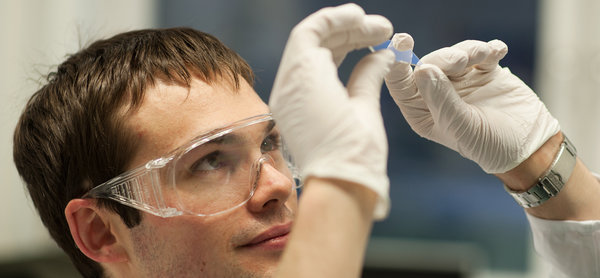
Research Program
Scientists in the "Biomolecular Systems" department use synthetic chemistry as an enabling technology to investigate complex biological systems with a particular focus on glycobiology. Carbohydrates play crucial roles for structure, energy storage and molecular recognition events that are essential to living organisms but are also important to infections, the immune response and cancer development. Complex sugars that coat most cells are the basis for vaccines against bacteria, parasites and viruses.
Automated glycan assembly quickly and reliably produces biologically relevant carbohydrates as large as 151-mers that serve as important probes for biological and medical research as well as for material science investigations. Many of the fundamental advances made in this department have translated into products and services by spin-off companies.
The core interests of our research are currently focused on the following areas:
Automated Glycan Assembly
Prof. Peter H. Seeberger
Automated oligosaccharide synthesis
• Innovating protecting groups, linkers and glycosylation reactions
• Novel instrumentation for automated glycan assembly
• Assembly of all classes of carbohydrates and glycoconjugates: N- and O-Glycans, GPI Anchors and Glycosaminoglycans
• Automated synthesis of glycopeptides and glycoproteins
Glycobiology and Vaccine Development
Prof. Peter H. Seeberger
Total Synthesis of Biologically Important Oligosaccharides
• Tumor-associated antigens
• Bacterial cell-surface antigens
Development of Carbohydrate-based Vaccines
• Synthetic Steptococcus pneumoniae vaccine
• Synthetic Klebsiella pneumoniae vaccine
• Synthetic Steptococcus suis vaccine
• Many other confidential targets
Continuous Flow Chemistry
Dr. Dario Cambié
• Autonomous synthesis in continuous-flow reactors
• Photochemistry in continuous flow
Synthetic Array Technologies
Dr. Felix Löffler
• Microarray technologies and diagnostic array applications
• Laser processing for parallelized high-throughput synthesis
• Novel synthesis strategies and instrumentation to generate biomolecules and (nano)materials
Carbohydrate Materials
Dr. Martina Delbianco
• Synthesis of well-defined natural and unnatural polysaccharides
• Structural studies of polysaccharides and their assemblies
• Creation of tailor-made carbohydrate materials
Synthetic Methodology and Reaction Design
Dr. John Molloy
• New strategies in synthetic organoboron chemistry
• Photocatalytic methods for the synthesis of structurally complex scaffolds
• Mechanistic probes for reaction development
Glycan-Targeted Therapeutics
Dr. Oren Moscovitz
• Development and functionalization of carbohydrate-specific alpaca-derived nanobodies and monoclonal antibodies
• Targeting parasitic and tumor-associated carbohydrate antigens for basic research, diagnostics, and therapeutics
Catalysis
Dr. Bartholomäus Pieber
• Development of photocatalytic reactions
• Chromoselective reactions
• New homogeneous and heterogeneous catalysts
• Mechanistic studies
Carbohydrates: Structure and Function
Dr. Christian Roth
• Structural Glycoenzymology